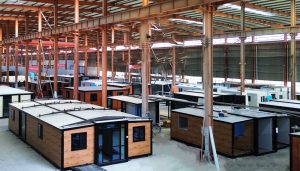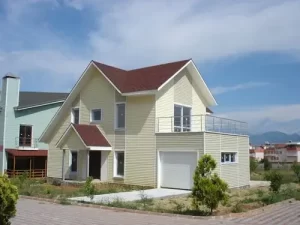In the 21st century, the rapid development of science and technology is changing our lives in an unprecedented way, and the construction industry, as the cornerstone of social development, has also ushered in a wave of intelligent transformation. Prefabricated houses, as an important part of this transformation, are leading the construction field towards a more efficient, environmentally friendly and intelligent future with their unique advantages.

Prefabricated House: Definition and Advantages
Prefabricated housing, also known as assembly building, is a form of building in which some or all of the components of a building are processed in a factory according to design requirements, then transported to the construction site and assembled by means of reliable connections. This process is similar to the manufacture of automobiles or airplanes, realizing the industrialization, standardization and modularization of building production.
The biggest advantage of prefabricated houses is their efficiency. Compared to traditional construction methods, prefabricated houses greatly shorten the construction cycle, reduce on-site wet work, lower labor costs, and improve construction safety. In addition, factory production can effectively control material waste and reduce construction waste, which is in line with the concept of green building. What's more, prefabricated houses are more strict in quality control, which can ensure the stability and durability of the building structure.

Intelligent: a new chapter of prefabricated houses
With the Internet of Things, big data, artificial intelligence and other technologies continue to mature, prefabricated houses no longer just stay in the structural optimization, but further integration of intelligent elements, opening a new chapter of building intelligence.
Intelligent home system: prefabricated houses can easily integrate intelligent home system, including intelligent lighting, temperature control, security, curtain control, etc. Users can realize remote control through cell phone APP to enjoy convenient and comfortable living experience. For example, the intelligent temperature control system can automatically adjust the indoor temperature according to the indoor and outdoor environments, which is both energy-saving and comfortable; the intelligent security system can monitor the safety of the house 24 hours a day and provide timely warning to protect the residents' property safety.
Energy Management System: Combined with green energy technologies such as solar photovoltaic panels, rainwater collection systems, and ground source heat pumps, the prefabricated houses are able to realize the efficient use of energy and self-sufficiency. Through the intelligent energy management system, the houses can automatically optimize energy distribution, reduce energy consumption, improve energy use efficiency and achieve truly green living.
Health monitoring and assistance: for the elderly and people with special needs, prefabricated houses can also be equipped with health monitoring systems, such as heart rate monitoring, fall detection, etc. Once abnormalities are detected, family members or medical institutions will be notified immediately, providing timely health protection.
Environmental adaptability: utilizing sensors and AI algorithms, prefabricated houses are able to sense changes in the external environment (e.g. temperature, humidity, air quality) and automatically adjust the indoor environment to create the most suitable living space. At the same time, some prefabricated house designs also take into account the response to natural disasters, such as earthquake early warning, flood defense, etc., which improves the safety and resilience of the building.
The future outlook: prefabricated houses and smart cities
The intelligent development of prefabricated houses not only improves the quality of living, but also provides important support for the construction of smart cities. With the acceleration of urbanization, smart city has become an inevitable trend of future urban development, and prefabricated houses, as a part of urban infrastructure, can seamlessly connect to the smart city platform with its intelligent characteristics to achieve data sharing, resource optimization and efficient management.
For example, through the Internet of Things (IoT) technology, prefabricated houses can participate in the construction of urban energy, transportation and information networks, becoming an indispensable part of the smart city ecosystem. In emergencies, such as public health emergencies, the intelligent system of prefabricated houses can respond quickly to provide residents with necessary material distribution, health monitoring and other services to enhance the city's emergency management capabilities.
Conclusion
The combination of prefabricated houses and intelligentization is not only a revolution of the traditional construction method, but also a reshaping of the future lifestyle. It lets us see that architecture is not only a shelter from the wind and rain, but also a living space integrating high efficiency, environmental protection and intelligence. With the continuous progress of technology and policy support, the intelligent road of prefabricated houses will be wider and wider, contributing to the construction of a more livable and sustainable urban environment. In the future, we have reason to believe that prefabricated houses will become an important force in promoting the intelligent transformation of the construction industry and even society as a whole.
Contact us if you are interested:uwantvlink@gmail.com
Welcome to our factory site:https://www.youtube.com/watch?v=v3ywS6Ukzpc
Post time: 10-28-2024







